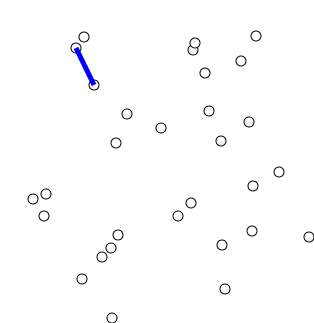
Prim’s algorithm to find the minimum cost spanning tree of for a weighted undirected graph, uses the greedy approach. Prim’s algorithm, in contrast with Kruskal’s algorithm, treats the nodes as a single tree and keeps on adding new nodes to the spanning tree from the given graph.
Prim’s algorithm
- Initialize a tree with a single vertex, chosen arbitrarily from the graph.
- Grow the tree by one edge: of the edges that connect the tree to vertices not yet in the tree, find the minimum-weight edge, and transfer it to the tree.
- Repeat step 2 (until all vertices are in the tree).

The time complexity of Prim’s algorithm depends on the data structures used for the graph and for ordering the edges by weight, which can be done using a priority queue. The average runtime= O((n+e)log n), where n=number of vertices, and e= number of edges.
Program in C :
#include<stdio.h>
#include<stdlib.h>
#define infinity 9999
#define LIMIT 10
#define NIL -1
#define PERMANENT 1
#define TEMPORARY 0
struct edge
{
int v;
int u;
};
int n;
int predecessor[LIMIT];
int adjacency_matrix[LIMIT][LIMIT];
int length[LIMIT];
int status[LIMIT];
int min_temp();
void new_graph();
void maketree(int root_var, struct edge tree[LIMIT]);
int main()
{
int tree_weight = 0;
int count, root;
struct edge tree[LIMIT];
new_graph();
printf("\nEnter Root Vertex:\t");
scanf("%d", &root);
maketree(root, tree);
printf("Enter Edges of the Spanning Tree:\n");
for(count = 1; count <= n - 1; count++)
{
printf("%d->", tree[count].u);
printf("%d\n", tree[count].v);
tree_weight = tree_weight + adjacency_matrix[tree[count].u][tree[count].v];
}
printf("Spanning Tree Weight:\t%d\n", tree_weight);
return 0;
}
void new_graph()
{
int count, LIMIT_edges, origin, destination, weight;
printf("Enter Number of Vertices:\t");
scanf("%d", &n);
LIMIT_edges = n * (n - 1) /2;
for(count = 1; count <= LIMIT_edges; count++)
{
printf("Enter Co- Ordinates of Edge No. %d(-1 -1 to quit):\n",count);
printf("Enter Origin Vaue:\t");
scanf("%d", &origin);
printf("Enter Destination Vaue:\t");
scanf("%d", &destination);
if((origin == -1) && (destination == -1))
{
break;
}
printf("Enter Weight of this Edge:\t");
scanf("%d", &weight);
if(destination < 0 || destination >= n || origin < 0 || origin >= n)
{
printf("Invalid Edge\n");
count--;
}
else
{
adjacency_matrix[origin][destination] = weight;
adjacency_matrix[destination][origin] = weight;
}
}
}
void maketree(int root_var, struct edge tree[LIMIT])
{
int current, count;
int temp = 0;
for(count = 0; count < n; count++)
{
predecessor[count] = NIL;
length[count] = infinity;
status[count] = TEMPORARY;
}
length[root_var] = 0;
while(1)
{
current = min_temp();
if(current == NIL)
{
if(temp == n - 1)
{
return;
}
else
{
printf("No Spanning Tree is Possible because Graph is disconnected\n");
exit(1);
}
}
status[current] = PERMANENT;
if(current != root_var)
{
count++;
tree[temp].u = predecessor[current];
tree[temp].v = current;
}
for(count = 0; count < n; count++)
{
if(adjacency_matrix[current][count] > 0 && status[count] == TEMPORARY)
{
if(adjacency_matrix[current][count] < length[count])
{
predecessor[count] = current;
length[count] = adjacency_matrix[current][count];
}
}
}
}
}
int min_temp()
{
int count;
int min = infinity;
int x = -1;
for(count = 0; count < n; count++)
{
if(status[count] == TEMPORARY && length[count] < min)
{
min = length[count];
x = count;
}
}
return x;
}Output:

Please comment below in case of any problem found during running the code or any other doubts.

